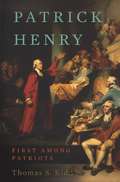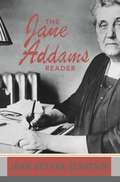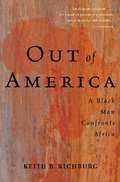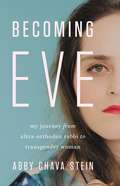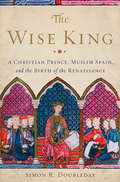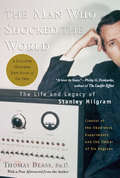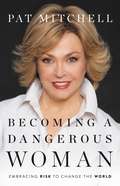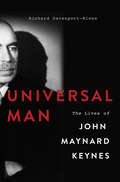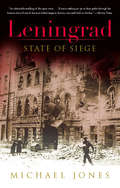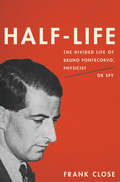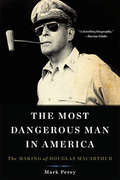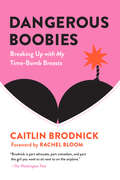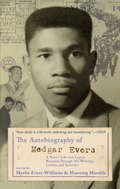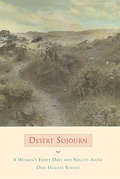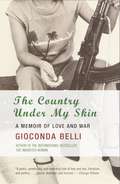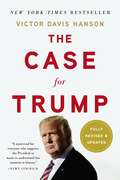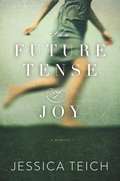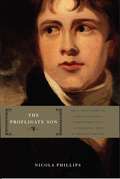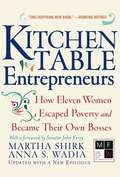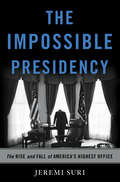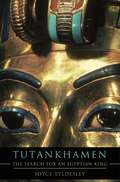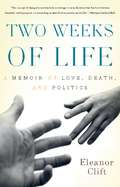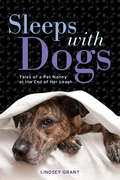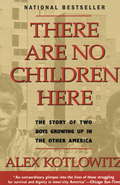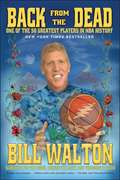- Table View
- List View
Patrick Henry: First Among Patriots
by Thomas S. KiddMost Americans know Patrick Henry as a fiery speaker whose pronouncement "Give me liberty or give me death!" rallied American defiance to the British Crown. But Henry's skills as an orator-sharpened in the small towns and courtrooms of colonial Virginia-are only one part of his vast, but largely forgotten, legacy. As historian Thomas S. Kidd shows, Henry cherished a vision of America as a virtuous republic with a clearly circumscribed central government. These ideals brought him into bitter conflict with other Founders and were crystallized in his vociferous opposition to the U.S. Constitution. In Patrick Henry, Kidd pulls back the curtain on one of our most radical, passionate Founders, showing that until we understand Henry himself, we will neglect many of the Revolution's animating values.
The Jane Addams Reader
by Jean Bethke ElshtainJane Addams was a prolific and elegant writer. Her twelve books consist largely of published essays, but to appreciate her life work one must also read her previously uncollected speeches and editorials. This artfully compiled collection begins with Addams's youthful Junior Class Oration on women as "Breadgivers," features thoughtful examinations of topics as diverse as "Tolstoy and Gandhi" and "The Public School and the Immigrant Child," and even includes popular essays on "The Subtle Problems of Charity," from The Atlantic Monthly, and "Need a Woman Over Fifty Feel Old?" from Ladies' Home Journal. Along with the writings themselves, Elshtain's insightful commentary offers powerful evidence of Addams's remarkable ability to frame social problems in an ethical context, her unwillingness to succumb to ideological dogma, her political courage, and her lifelong devotion to civic and moral life.
Out Of America: A Black Man Confronts Africa
by Keith B. RichburgNothing in Keith Richburg's long and respected journalistic career at the Washington Post prepared him for what he would encounter as the paper's correspondent in Africa. He found a continent where brutal murder had become routine, where dictators and warlords silenced dissent with machine guns and machetes, and where starvation had become depressingly common. With a great deal of personal anguish, Richburg faced a difficult question: If this is Africa, what does it mean to be an African American?In this provocative and unvarnished account of his three years on the continent of his ancestors, Richburg takes us on a extraordinary journey that sweeps from Somalia to South Africa, showing how he confronted the divide between his African racial heritage and his American cultural identity.
Becoming Eve: My Journey from Ultra-Orthodox Rabbi to Transgender Woman
by Abby SteinThe powerful coming-of-age story of an ultra-Orthodox child who was born to become a rabbinic leader and instead became a womanAbby Stein was raised in a Hasidic Jewish community in Brooklyn, isolated in a culture that lives according to the laws and practices of eighteenth-century Eastern Europe, speaking only Yiddish and Hebrew and shunning modern life. Stein was born as the first son in a dynastic rabbinical family, poised to become a leader of the next generation of Hasidic Jews. But Abby felt certain at a young age that she was a girl. She suppressed her desire for a new body while looking for answers wherever she could find them, from forbidden religious texts to smuggled secular examinations of faith. Finally, she orchestrated a personal exodus from ultra-Orthodox manhood to mainstream femininity-a radical choice that forced her to leave her home, her family, her way of life. Powerful in the truths it reveals about biology, culture, faith, and identity, Becoming Eve poses the enduring question: How far will you go to become the person you were meant to be?
The Wise King: A Christian Prince, Muslim Spain, and the Birth of the Renaissance
by Simon R. Doubleday"If I had been present at the Creation,” the thirteenth-century Spanish philosopher-king Alfonso X is said to have stated, "Many faults in the universe would have been avoided. ” Known as El Sabio, "the Wise,” Alfonso was renowned by friends and enemies alike for his sparkling intellect and extraordinary cultural achievements. In The Wise King, celebrated historian Simon R. Doubleday traces the story of the king’s life and times, leading us deep into his emotional world and showing how his intense admiration for Spain’s rich Islamic culture paved the way for the European Renaissance. In 1252, when Alfonso replaced his more militaristic father on the throne of Castile and León, the battle to reconquer Muslim territory on the Iberian Peninsula was raging fiercely. But even as he led his Christian soldiers onto the battlefield, Alfonso was seduced by the glories of Muslim Spain. His engagement with the Arabic-speaking culture of the South shaped his pursuit of astronomy, for which he was famed for centuries, and his profoundly humane vision of the world, which Dante, Petrarch, and later Italian humanists would inherit. A composer of lyric verses, and patron of works on board games, hunting, and the properties of stones, Alfonso is best known today for his Cantigas de Santa María (Songs of Holy Mary), which offer a remarkable window onto his world. His ongoing struggles as a king and as a man were distilled--in art, music, literature, and architecture--into something sublime that speaks to us powerfully across the centuries. An intimate biography of the Spanish ruler in whom two cultures converged, The Wise King introduces readers to a Renaissance man before his time, whose creative energy in the face of personal turmoil and existential threats to his kingdom would transform the course of Western history.
The Man Who Shocked The World: The Life and Legacy of Stanley Milgram
by Thomas BlassCreator of the famous Obedience Experiments and originator of the ?six degrees of separationOCO theory, Stanley Milgram transformed our understanding of human nature and continues to be one of the most important figures in psychology and beyond. In this sparkling biography, Thomas Blass captures the colorful personality and pioneering work of a visionary scientist who revealed the hidden workings of our social world. In this new paperback edition, he includes an afterword connecting MilgramOCOs theories to torture, war crimes, and Abu Ghraib. "
Becoming a Dangerous Woman: Embracing Risk to Change the World
by Pat MitchellAn intimate and inspiring memoir and call to action from Pat Mitchell -- groundbreaking media icon, global advocate for women's rights, and co-founder and curator of TEDWomen Pat Mitchell is a serial ceiling smasher. The first woman to own and host a nationally syndicated daily talk show, and the first female president of CNN productions and PBS, Mitchell has been lauded as a powerful changemaker and a relentless advocate for women and girls.In Becoming a Dangerous Woman, Mitchell shares her own path to power, from a childhood spent on a cotton farm in the South to her unprecedented rise in media and global affairs. Full of intimate, fascinating stories, such as an encounter with Fidel Castro while wearing a swimsuit, and traveling to war zones with Eve Ensler and Glenn, Becoming a Dangerous Woman is an inspiring call to arms for women who are ready to dismantle the barriers they see in their own lives.
Universal Man: The Lives of John Maynard Keynes
by Richard Davenport-HinesIn Universal Man, noted biographer and historian Richard Davenport-Hines revives our understanding of John Maynard Keynes (1883-1946), the twentieth century’s most charismatic and revolutionary economist. Keynes helped FDR launch the New Deal, saved Britain from financial crisis twice over the course of two World Wars, and instructed Western nations on how to protect themselves from revolutionary unrest, economic instability, high unemployment, and social dissolution. Isaiah Berlin called Keynes “the cleverest man I ever knew”—both “superior and intellectually awe-inspiring. ” Eric Hobsbawm, the twentieth century’s preeminent historian, considered him as influential as Lenin, Stalin, Roosevelt, Hitler, Churchill, Gandhi, and Mao. Keynes was nothing less than the Adam Smith of his time: his General Theory of Employment, Interest and Money, published in 1936, became the most important economics book of the twentieth century, as important as Smith’s Wealth of Nations in inaugurating an economic era. Keynes’s brilliant ideas made possible 35 years of prosperity after the Second World War, the most sustained period of rapid expansion in history. And now, and in the wake of the 2008 global economic collapse, he is once again shaping our world. Every day, we are likely to hear about “Keynesian economics” or the “Keynesian Revolution,” terms that testify to his continuing influence on both economic theory and government policies. Indeed, with the thorough discrediting of his opponents—Friedrich Hayek, Milton Friedman, Alan Greenspan, and other supporters of the notion that capitalism is self-regulating, and needs no government intervention—nations across the world are turning to Keynes’s signature innovations: above all that governments must involve themselves in their economies to stave off financial collapse. Previous biographies have explored Keynes economic thought at great length and often in the jargon of the discipline. Universal Man is the first accessible biography of Keynes, and reveals Keynes as much more than an economist. Like many Englishmen of his class and era, Keynes compartmentalized his life. Accordingly, Davenport-Hines views Keynes through multiple windows, as a youthful prodigy, a powerful government official, an influential public man, a bisexual living in the shadow of Oscar Wilde’s persecution, a devotee of the arts, and an international statesman of great renown. Delving into Keynes’s experiences and thought, Davenport-Hines shows us a man who was equally at ease socialising with the Bloomsbury Group as he was persuading heads of state to adopt his policies. Exploring the desires and experiences that compelled Keynes to innovate, Davenport-Hines is the first to argue that Keynesian economics has an aesthetic basis. In this book we come to understand not just the most enduringly influential economist of the modern era, but one of the most gifted and vital men of our times: a disciplined logician with a capacity for glee who persuaded people, seduced them, subverted old ideas, and installed new ones; a man whose high brilliance did not give people vertigo, but clarified and lengthened their perspectives. Engaging, learned, and sparkling with wit and insight, Universal Man is the perfect match for its subject.
Leningrad: State of Siege
by Michael Jones"All offers of surrender from Leningrad must be rejected,” wrote Adolph Hitler on September 29, 1941, at the outset of Operation Barbarossa. "In this struggle for survival, we have no interest in keeping even a proportion of the city’s population alive. ” During the famed 900-day siege of Leningrad, the German High Command deliberately planned to eradicate the city’s population through starvation. Viewing the Slavs as sub-human, Hitler embarked on a vicious program of ethnic cleansing. By the time the siege ended in January 1944, almost a million people had died. Those who survived would be marked permanently by what they endured as the city descended into chaos. In Leningrad, military historian Michael Jones chronicles the human story of this epic siege. Drawing on newly available eyewitness accounts and diaries, he reveals the true horrors of the ordeal--including stories long-suppressed by the Soviets of looting, criminal gangs, and cannibalism. But he also shows the immense psychological resources on which the citizens of Leningrad drew to survive against desperate odds. At the height of the siege, for instance, an extraordinary live performance of Shostakovich’s Seventh Symphony profoundly strengthened the city’s will to resist. A riveting account of one of the most harrowing sieges of world history, Leningrad also portrays the astonishing power of the human will in the face of even the direst catastrophe.
Half-Life: The Divided Life of Bruno Pontecorvo, Physicist or Spy
by Frank CloseBruno Pontecorvo dedicated his career to hunting for the Higgs boson of his day: the neutrino, a nearly massless particle considered essential to the process of nuclear fission. His work on the Manhattan project under Enrico Fermi confirmed his reputation as a brilliant physicist and helped usher in the nuclear age. He should have won a Nobel Prize, but late in the summer of 1950 he vanished. At the height of the Cold War, Pontecorvo had disappeared behind the Iron Curtain. In Half-Life, physicist and historian Frank Close offers a heretofore untold history of Pontecorvo’s life, based on unprecedented access to his friends, family, and colleagues. With all the elements of a Cold War thriller-classified atomic research, an infamous double agent, a kidnapping by Soviet operatives-Half-Life is a history of particle physics at perhaps its most powerful: when it created the bomb.
The Most Dangerous Man In America: The Making of Douglas MacArthur
by PerryAt times, even his admirers seemed unsure of what to do with General Douglas MacArthur. Imperious, headstrong, and vain, MacArthur matched an undeniable military genius with a massive ego and a rebellious streak that often seemed to destine him for the dustbin of history. Yet despite his flaws, MacArthur is remembered as a brilliant commander whose combined-arms operation in the Pacific--the first in the history of warfare--secured America’s triumph in World War II and changed the course of history. In The Most Dangerous Man in America, celebrated historian Mark Perry examines how this paradox of a man overcame personal and professional challenges to lead his countrymen in their darkest hour. As Perry shows, Franklin Roosevelt and a handful of MacArthur’s subordinates made this feat possible, taming MacArthur, making him useful, and finally making him victorious. A gripping, authoritative biography of the Pacific Theater’s most celebrated and misunderstood commander, The Most Dangerous Man in America reveals the secrets of Douglas MacArthur’s success--and the incredible efforts of the men who made it possible.
Dangerous Boobies: Breaking Up with My Time-Bomb Breasts
by Caitlin Brodnick Rachel BloomAfter watching too many family members die of cancer, at age 28, public speaker and comedian Caitlin Brodnick was tested for the BRCA1 gene mutation and tested positive, indicating an 87% chance she'd likely be diagnosed with breast cancer in her lifetime. She had a preventative double mastectomy, thereby becoming an everywoman's Angelina Jolie.Dangerous Boobies: Breaking Up with My Time-Bomb Breasts goes in depth into her experience from testing to surgery and on to recovery. With a warm, funny, and approachable voice, Caitlin tells readers the full story, even sharing what it was like to go from a size 32G bra--giant, for a woman who is barely over five feet tall!--to a 32C. Engaging and open, she admits to having hated her breasts long before her surgery, and enjoying the process of "designing" her new breasts, from the shape of the breasts to the size and color of the nipples. While Caitlin's primary narrative explores the BRCA gene and breast cancer, her story is also one about body acceptance and what it takes to be confident with and in charge of one's body. Her speaking engagements and comedy routines have shown that the wider topic of breasts, breast size, and personal identity is resonating with younger readers.
The Autobiography of Medgar Evers: A Hero's Life and Legacy Revealed Through his Writings, Letters, and Speeches
by Manning Evers-Williams Myrlie MarableThe Autobiography of Medgar Evers is the first and only comprehensive collection of the words of slain civil rights hero Medgar Evers. Evers became a leader of the civil rights movement during the late 1950s and early 1960s. He established NAACP chapters throughout the Mississippi delta region, and eventually became the NAACP’s first field secretary in Mississippi. Myrlie Evers-Williams, Medgar’s widow, partnered with Manning Marable, one of the country’s leading black scholars, to develop this book based on the previously untouched cache of Medgar’s personal documents and writings. These writings range from Medgar’s monthly reports to the NAACP to his correspondence with luminaries of the time such as Robert Carter, General Counsel for the NAACP in the landmark Brown v. Board of Education case. Still, most moving of all, is the preface written by Myrlie Evers.
Desert Sojourn: A Woman's Forty Days and Nights Alone (Adventura Books)
by Debi Holmes-BinneyAt age 31, having left a stifling decade-long marriage, Debi Holmes-Binney set off alone into the harsh Utah desert to find direction and spiritual renewal. Armed with only basic supplies and her writing journals, she planned to spend forty days and nights alone; what followed was an extended sojourn in a place by turns physically terrifying, psychologically invigorating, and gloriously beautiful. Desert Sojourn is a wonderfully fresh, perceptive, and moving account of self-discovery that will appeal to both physical and spiritual adventurers.
The Country Under My Skin: A Memoir of Love and War
by Gioconda BelliUntil her early twenties, Gioconda Belli inhabited an upper-class cocoon: sheltered from the poverty in Managua in a world of country clubs and debutante balls; educated abroad; early marriage and motherhood. But in 1970, everything changed. Her growing dissatisfaction with domestic life, and a blossoming awareness of the social inequities in Nicaragua, led her to join the Sandinistas, then a burgeoning but still hidden organization. She would be involved with them over the next twenty years at the highest, and often most dangerous, levels. Her memoir is both a revelatory insider's account of the Revolution and a vivid, intensely felt story about coming of age under extraordinary circumstances. Belli writes with both striking lyricism and candor about her personal and political lives: about her family, her children, the men in her life; about her poetry; about the dichotomies between her birth-right and the life she chose for herself; about the failures and triumphs of the Revolution; about her current life, divided between California (with her American husband and their children) and Nicaragua; and about her sustained and sustaining passion for her country and its people.
The Case for Trump
by Victor Davis HansonFrom an award-winning historian and regular Fox contributor, the true story of how Donald Trump has become one of the most successful presidents in history -- and why America needs him now more than ever <P><P> In The Case for Trump, award-winning historian and political commentator Victor Davis Hanson explains how a celebrity businessman with no political or military experience triumphed over sixteen well-qualified Republican rivals, a Democrat with a quarter-billion-dollar war chest, and a hostile media and Washington establishment to become president of the United States -- and an extremely successful president. <P><P>Trump alone saw a political opportunity in defending the working people of America's interior whom the coastal elite of both parties had come to scorn, Hanson argues. <P><P>And Trump alone had the instincts and energy to pursue this opening to victory, dismantle a corrupt old order, and bring long-overdue policy changes at home and abroad. <P><P>We could not survive a series of presidencies as volatile as Trump's. But after decades of drift, America needs the outsider Trump to do what normal politicians would not and could not do. <P><b>A New York Times Bestseller</b>
The Future Tense of Joy: A Memoir
by Jessica Teich"'No one was less likely to take her own life.’ That’s what her Oxford thesis advisor wrote. From the moment I stumbled across the obituary, late at night when I couldn’t sleep, I was captivated, and it wasn’t the terrible details of her death: That she leapt from the balcony of a high rise in Century City. That she was 27, and a newlywed.” So begins Jessica Teich’s quest to unravel a mystery: the suicide of someone she never met. Bright and accomplished, with a loving family, Jessica knows she should be happy. But a violent childhood has left its mark. Jessica fears she will never be free of her past-until she discovers the obituary of a young woman, whose life is a ghostly echo of her own. Can Jessica discover what drove this brilliant young woman to kill herself? And will discovering the truth save Jessica from the fissures tearing apart her own life? A deeply intimate psychological memoir, The Future Tense of Joy is the luminous account of one woman’s efforts to free herself, and her family, from the demons of the past. Witty, brave and suspenseful, the book has been hailed by Meryl Streep as "beautiful, compassionately imagined.” Steve Martin called it "a daring and intimate journey into the soul of motherhood.”
The Profligate Son: Or, A True Story of Family Conflict, Fashionable Vice, and Financial Ruin in Regency Britain
by Nicola PhillipsFoppish, impulsive, and philandering: William Jackson was every Georgian parent’s worst nightmare. Gentlemen were expected to be honorable and virtuous, but William was the opposite, much to the dismay of his father, a well-to-do representative of the East India Company in Madras. In The Profligate Son, historian Nicola Phillips meticulously reconstructs William’s life from a recently discovered family archive, describing how his youthful misbehavior reduced his family to ruin. At first, William seemed destined for a life of great fortune, but before long, he was indulging regularly in pornography and brothels and using his father’s abundant credit to swindle tradesmen. Eventually, William found himself in debtor’s prison and then on a long, typhus-ridden voyage to an Australian penal colony. He spent the rest of his days there, dying a pauper at the age of thirty-seven. A masterpiece of literary nonfiction as dramatic as any Dickens novel, The Profligate Son transports readers from the steamy streets of India, to London’s elegant squares and seedy brothels, to the sunbaked shores of Australia, tracing the arc of a life long buried in history.
Kitchen Table Entrepreneurs: How Eleven Women Escaped Poverty and Became Their Own Bosses
by Martha Shirk Anna S. WadiaOver the last five years, the number of women-owned businesses has grown at twice the rate of all U. S. firms; in the next few years, the number is expected to surpass the six million mark. Kitchen Table Entrepreneurs tells the inspirational stories of eleven low-income women who have marshaled the creative energy, confidence, and capital necessary to start their own small businesses. These women, who have used their entrepreneurial skills as a route out of poverty, give an American face to an economic empowerment tool that has enjoyed great success in developing countries. By becoming their own bosses, they not only provide for their children but also inspire them. Though each of their businesses is unique, all eleven of these women have discovered previously unknown strengths as they've struggled to overcome personal and bureaucratic obstacles. All received important assistance from nonprofit organizations supported by the Ms. Foundation for Women, the pioneer funding entity of microenterprise programs in the United States. Updated with a new epilogue.
The Impossible Presidency: The Rise and Fall of America's Highest Office
by Jeremi SuriA bold new history of the American presidency, arguing that the successful presidents of the past created unrealistic expectations for every president since JFK, with enormously problematic implications for American politicsIn The Impossible Presidency, celebrated historian Jeremi Suri charts the rise and fall of the American presidency, from the limited role envisaged by the Founding Fathers to its current status as the most powerful job in the world. He argues that the presidency is a victim of its own success-the vastness of the job makes it almost impossible to fulfill the expectations placed upon it. As managers of the world's largest economy and military, contemporary presidents must react to a truly globalized world in a twenty-four-hour news cycle. There is little room left for bold vision.Suri traces America's disenchantment with our recent presidents to the inevitable mismatch between presidential promises and the structural limitations of the office. A masterful reassessment of presidential history, this book is essential reading for anyone trying to understand America's fraught political climate.
Tutankhamen: The Search for an Egyptian King
by Joyce TyldesleyThe discovery of King Tutankhamen's tomb in 1922 was perhaps the world's most important archaeological find. The only near-intact royal tomb to be preserved in the Valley of the Kings, it has supplied an astonishing wealth of artifacts, spurred a global fascination with ancient Egypt, and inspired folklore that continues to evolve today. Despite the tomb's prominence, however, precious little has been revealed about Tutankhamen himself. In Tutankhamen, acclaimed Egyptologist Joyce Tyldesley unshrouds the enigmatic king. She explores his life and legacy as never before, and offers a compelling new window onto the world in which he lived. Tutankhamen ascended to the throne at approximately eight years of age and ruled for only ten years. Although his reign was brief and many of his accomplishments are now lost to us, it is clear that he was an important and influential king ruling in challenging times. His greatest achievement was to reverse a slew of radical and unpopular theological reforms instituted by his father and return Egypt to the traditional pantheon of gods. A meticulous examination of the evidence preserved both within his tomb and outside it allows Tyldesley to investigate Tutankhamen's family history and to explore the origins of the pervasive legends surrounding Tutankhamen's tomb. These legends include Tutankhamen's "curse"--an enduring myth that reaffirms the appeal of ancient magic in our modern world A remarkably vivid portrait of this fascinating and often misunderstood ruler, Tutankhamen sheds new light on the young king and the astonishing archeological discovery that earned him an eternal place in popular imagination.
Two Weeks of Life: A Memoir of Love, Death, and Politics
by Eleanor CliftWhile Eleanor Clift cared for her husband, journalist Tom Brazaitis, through the last two weeks of his life, the nation watched a very different death play out as Terri Schiavo entered her final days. In the commonalities and contradictions between these events, Clift probes the underlying questions: How should we handle the decisions surrounding a loved oneOCOs death? What if that loved one did not?or cannot?speak to us about these issues?"
Sleeps with Dogs: Tales of a Pet Nanny at the End of Her Leash
by Lindsey GrantGo behind closed doors and discover the secret lives of some of the most devoted pet owners, whether they're feeding their dogs home-cooked meals or leaving Animal Planet on all day to keep their pets company.As a round-the-clock animal nanny, Lindsey Grant shared a bed with countless dogs, cooked custom meals for exotic birds, broke up brawls between animals and spouses alike, weathered end-of-life care for beloved companions, and catered to the often obscure needs of her charges-and the bizarre demands of their owners. She offers a hilarious inside look at the pet care industry and the lengths people will go to for their furry friends.With a cast of unforgettable characters, from a toast-loving cockatiel to a gassy greyhound, Sleeps with Dogs is filled with tales of pets and those who love them.
There Are No Children Here: The Story of Two Boys Growing Up in The Other America
by Alex KotlowitzThis is the moving and powerful account of two remarkable boys struggling to survive in Chicago's Henry Horner Homes, a public housing complex disfigured by crime and neglect.
Back from the Dead
by Bill WaltonThis inspiring memoir from sports and cultural icon Bill Walton recounts his devastating injuries and amazing recoveries, set in the context of his UCLA triumphs under John Wooden, his storied NBA career, and his affinity for music and the Grateful Dead. In February 2008, Bill Walton suffered a catastrophic spinal collapse—the culmination of a lifetime of injuries—that left him unable to move. He spent three years on the floor of his house, eating his meals there and crawling to the bathroom, where he could barely hoist himself up onto the toilet. The excruciating pain and slow recovery tested Walton to the fullest. But with extraordinary patience, fortitude, determination, and sacrifice—and pioneering surgery—he recovered, and now shares his life story in this remarkable and unique memoir. Walton grew up in San Diego in the 1950s and 1960s and was deeply influenced by the political and cultural upheavals of that period. Although he strongly identified with the cool people, particularly in music and politics, his greatest role model outside his family was super-straight UCLA basketball coach John Wooden, a thoughtful, rigorous mentor who seemed immune to the turmoil of the times. Although there was always tension and conflict between them, the two men would speak nearly every day for forty-three years, until Wooden’s death at age ninety-nine. Despite a lifelong stuttering affliction, Walton chose a career in broadcasting after his playing days ended. He eventually won an Emmy Award and other accolades for broadcasting and was recognized as a leading media pundit. John Wooden once said that no greatness ever came without sacrifice. Nothing better illustrates this saying than the real story of Walton’s life. In his own words, Back from the Dead shares this dramatic story, including his basketball and broadcasting careers, his many setbacks and rebounds, and his ultimate triumph as the toughest of champions.
